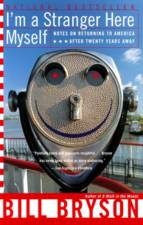

| Click on a book's image or title to order from Amazon.com |

I'm a Stranger Here Myself
Broadway Books, TPB, © 1999, 288 pp, ISBN #0-767-90382-XReviewed March 2002
I gave in to a friend suggesting I read Bryson's work, and I'm glad I did, as I got more good chuckles and laugh-out-loud moments out of this book than in anything I've read in many months.
It's probably inevitable that Bryson would be compared to other modern humorists. The comparison to Dave Barry is apt largely because they both write brief essays on specific topics, and both tend to end their essays with sudden and silly references to something the touched on earlier in the essay. The comparison really ends with the structural, though, since Barry seems more taken with bathroom humor and taking a ridiculous idea to its absurd extreme than is Bryson.
Bryson seems more inclined to touch on issues that seem to have gone to a ridiculous extreme on their own, and that combined with his use of wordplay seem reminiscent of Douglas Adams (remember Adams' bit in The Hitchhiker's Guide to the Galaxy about the notice that Arthur Dent's house is going to be bulldozed being locked safely somewhere that Dent couldn't possibly find it? It would fit right into a Bryson essay). For instance, consider the piece "What's Cooking", about the ridiculousness of ordering at a fancy restaurant:
Bryson doesn't simply rely on the ridiculous, though; many of his essays have real heart and fondness behind them. For instance, "Mail Call", which is very funny in its contrast of the US Postal Service with its penchant for customer appreciation days, and Britain's Royal Mail with its impersonal attitude but uncanny ability to get the mail where it needs to go under adverse conditions.
If you didn't already know, I'm a Stranger Here Myself was written as a series of articles for a British periodical by Bryson shortly after he and his family had moved from England to the US. Bryson is a native American (though his wife is British), but had been living abroad for 20 years. Even beyond the culture shock, Bryson had to adjust to the fact that things simply changed a lot in America between 1975 and 1995, so his book is part contrast between Britain and America, part contrast between modern America and 1950s/60s America, and part opinion on the state of life in the country generally. Much of the book is genuinely endearing besides being funny. It's almost enough to make me move to Britain to have the same experience myself of returning to the US after 20 years.
Alas, the essays become less insightful as time passes, and as (I imagine) Bryson acclimated to his new life in America. He focuses more and more on general ridiculousness in life, and less on the contrast between America and Britain, which is where the book's soul lies. So, for instance, essays about the difficulty of using a Windows-based computer, or about the film Titanic, fall flat. And the essay on the US income tax forms seems entirely generic (what, for instance, are the British forms like, I wonder?).
Despite this, fans of lively humor essayists should certainly give this a try. Another good comparison might be with Richard Feynman's autobiographical Surely You're Joking, Mr. Feynman; both books are funny, uplifting, and make you feel good just to be alive. It's heartwarming to know that there are people like Bryson in the world.
hits since 12 March 2002.